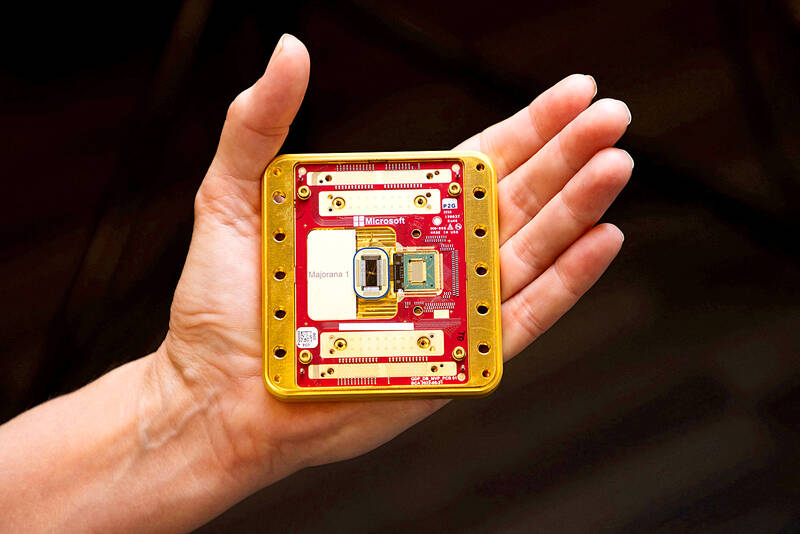Microsoft Corp on Wednesday unveiled a new computer chip that it says could transform everything from fighting pollution to developing new medicines, joining Google and IBM Corp in arguing that the promise of quantum computing is closer to reality.
The US-made chip, called Majorana 1, can fit in the palm of a hand, but packs a revolutionary design that Microsoft believes would solve one of the biggest challenges in quantum computing — making these super-powerful machines reliable enough for real-world use.
“We took a fresh approach and basically reinvented how quantum computers could work,” Microsoft senior scientist Chetan Nayak said.

Photo courtesy of Microsoft Corp via Reuters
The company said its breakthrough was confirmed in research published on Wednesday in the scientific journal Nature.
The new Majorana 1 chip uses a special approach to building quantum computers that could make them more stable and easier to scale up than the work done by Google or IBM, which are considered leaders in the field.
While the chip represents a major advance, Microsoft acknowledges that more engineering work lies ahead before quantum computers become practical tools. However, the company said the breakthrough could make that reality possible within “years rather than decades.”
Nvidia Corp chief executive officer Jensen Huang (黃仁勳) last month said that quantum technology was two decades away from overtaking his company’s chips, the workhorses of artificial intelligence (AI).
Google has said that commercial quantum computing applications are only five years away, while IBM expects large-scale quantum computers to be online by 2033.
Unlike regular computers that process information as 1s and 0s, quantum computers harness the strange properties of atomic particles, measured as qubits, to potentially solve problems that would take today’s most powerful supercomputers thousands of years.
Separately, Nvidia and research partners have created what they call the largest AI system yet for biological research, the company said on Wednesday, aiming to speed up breakthroughs in medicine and genetics.
The new AI system, called Evo 2, can read and design genetic code across all forms of life. Scientists have high hopes that such AI technology would dramatically accelerate research by spotting patterns in vast amounts of data that would normally take years to analyze by hand.
The model was built using 2,000 Nvidia H100 processors on Amazon.com Inc’s cloud infrastructure.
Developed with the Arc Institute and Stanford University, Evo 2 is now freely available to scientists worldwide through Nvidia’s BioNeMo research platform.
Beyond medicine, researchers believe the technology could help create crops that better withstand climate change and develop new ways to break down pollution.

RECYCLE: Taiwan would aid manufacturers in refining rare earths from discarded appliances, which would fit the nation’s circular economy goals, minister Kung said Taiwan would work with the US and Japan on a proposed cooperation initiative in response to Beijing’s newly announced rare earth export curbs, Minister of Economic Affairs Kung Ming-hsin (龔明鑫) said yesterday. China last week announced new restrictions requiring companies to obtain export licenses if their products contain more than 0.1 percent of Chinese-origin rare earths by value. US Secretary of the Treasury Scott Bessent on Wednesday responded by saying that Beijing was “unreliable” in its rare earths exports, adding that the US would “neither be commanded, nor controlled” by China, several media outlets reported. Japanese Minister of Finance Katsunobu Kato yesterday also

Jensen Huang (黃仁勳), founder and CEO of US-based artificial intelligence chip designer Nvidia Corp and Taiwan Semiconductor Manufacturing Co (TSMC, 台積電) on Friday celebrated the first Nvidia Blackwell wafer produced on US soil. Huang visited TSMC’s advanced wafer fab in the US state of Arizona and joined the Taiwanese chipmaker’s executives to witness the efforts to “build the infrastructure that powers the world’s AI factories, right here in America,” Nvidia said in a statement. At the event, Huang joined Y.L. Wang (王英郎), vice president of operations at TSMC, in signing their names on the Blackwell wafer to

‘DRAMATIC AND POSITIVE’: AI growth would be better than it previously forecast and would stay robust even if the Chinese market became inaccessible for customers, it said Taiwan Semiconductor Manufacturing Co (TSMC, 台積電) yesterday raised its full-year revenue growth outlook after posting record profit for last quarter, despite growing market concern about an artificial intelligence (AI) bubble. The company said it expects revenue to expand about 35 percent year-on-year, driven mainly by faster-than-expected demand for leading-edge chips for AI applications. The world’s biggest contract chipmaker in July projected that revenue this year would expand about 30 percent in US dollar terms. The company also slightly hiked its capital expenditure for this year to US$40 billion to US$42 billion, compared with US$38 billion to US$42 billion it set previously. “AI demand actually

RARE EARTHS: The call between the US Treasury Secretary and his Chinese counterpart came as Washington sought to rally G7 partners in response to China’s export controls China and the US on Saturday agreed to conduct another round of trade negotiations in the coming week, as the world’s two biggest economies seek to avoid another damaging tit-for-tat tariff battle. Beijing last week announced sweeping controls on the critical rare earths industry, prompting US President Donald Trump to threaten 100 percent tariffs on imports from China in retaliation. Trump had also threatened to cancel his expected meeting with Chinese President Xi Jinping (習近平) in South Korea later this month on the sidelines of the APEC summit. In the latest indication of efforts to resolve their dispute, Chinese state media reported that